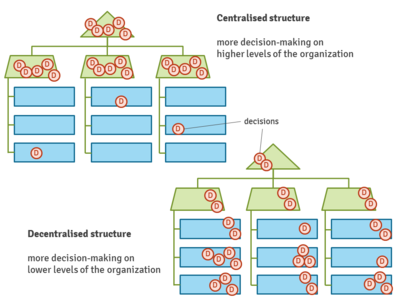Centralized organizational structure: Difference between revisions
(Infobox update) |
|||
| Line 19: | Line 19: | ||
==Arguments for centralized organizational structure== | ==Arguments for centralized organizational structure== | ||
[[File:centralised_vs_decentralized_organizational_structure.png|400px|right|thumb|Fig.1. Centralised vs decentralised organizational structure]] | |||
* bright, energetic people with a [[knowledge]] are rare, there is [[need]] to concentrate power in their hands | * bright, energetic people with a [[knowledge]] are rare, there is [[need]] to concentrate power in their hands | ||
* both large and small organizations [[need]] coordination and integration of their various activities. This is best can be achieved by a centralized authority, solving general problems. | * both large and small organizations [[need]] coordination and integration of their various activities. This is best can be achieved by a centralized authority, solving general problems. | ||
* in large and diversified [[organization]], various managers can think differently and focus on their own units, perhaps exaggerating their significance for the whole [[organization]]. Often overall interest organizations will require unpopular decision with which most of the staff did not agree. Only centralized [[management]] can make such decisions, | * in large and diversified [[organization]], various managers can think differently and focus on their own units, perhaps exaggerating their significance for the whole [[organization]]. Often overall interest organizations will require unpopular decision with which most of the staff did not agree. Only centralized [[management]] can make such decisions, | ||
* the confidentiality of strategic plans and tactical decisions is easier to maintain if they are known by only a small group at the top. | * the confidentiality of strategic plans and tactical decisions is easier to maintain if they are known by only a small group at the top. | ||
==Arguments against centralized organizational structure== | ==Arguments against centralized organizational structure== | ||
Revision as of 08:37, 8 September 2020
| Centralized organizational structure |
|---|
| See also |
Centralized organizational structure assigns formal decision-making powers to managers. Centralization depends on how much decision-making power is passed on to the lower levels in the organization. Centralization and decentralization are not alternative - are rather a matter of the degree of transfer of decision-making powers. It is understood that no organization is fully centralized or decentralized. You can only say that the company has a relatively centralized functions, others relatively decentralized. In theory, ideal centralized organization would have one authoritative person as manager, all-knowing and absolutely wise. This person could, therefore, take all the important decisions. The effectiveness of such organization would be the same as in the case of complete decentralization, in which each employee on the lowest level would be all-knowing and wise in his responsibility. So there is no theoretical advantage of centralization over decentralization.
The conflict between centralized organizational structure and decentralized organizational structure is reflected in the arguments against the one and the other solution.
Arguments for centralized organizational structure
- bright, energetic people with a knowledge are rare, there is need to concentrate power in their hands
- both large and small organizations need coordination and integration of their various activities. This is best can be achieved by a centralized authority, solving general problems.
- in large and diversified organization, various managers can think differently and focus on their own units, perhaps exaggerating their significance for the whole organization. Often overall interest organizations will require unpopular decision with which most of the staff did not agree. Only centralized management can make such decisions,
- the confidentiality of strategic plans and tactical decisions is easier to maintain if they are known by only a small group at the top.
Arguments against centralized organizational structure
- during growth and increase of complexity of organization, leadership could not maintain centralized control. This is a physical impossibility. Because the deterioration of the quality of the central control is unavoidable, it should be logical to increase decentralization by delegation,
- decentralization gives powers in the hands of the best managers familiar with details of their products, customers and market conditions. Their guidelines, policies and procedures will therefore always be more appropriate than those made by the central authorities,
- decentralization leads to the creation of the organizational cells small enough to be known fully by managers and to identify with them. If the manager has sufficient authority, organization can benefit from the same kind of commitment and motivation, as in the case of the manager-owner.
- Shifting decision-making power down the organization will allow the participation of a greater number of people. This will increase the overall motivation and job satisfaction, and development of managers will be more effective.
See also:
- Linear structure
- Divisional structure
- Departmental structure
- Formalization
- Organization types
- Principles and features of organizational structure
References
- Alonso, R., Dessein, W., & Matouschek, N. (2008). When does coordination require centralization?. The American economic review, 98(1), 145-179.
- Brooke, M. Z. (1984). Centralization and autonomy: A study in organization behaviour. Praeger Publishers.
- Hage, J., & Aiken, M. (1967). Relationship of centralization to other structural properties. Administrative Science Quarterly, 72-92.
- Simon, H. A. (1954). Centralization vs. decentralization in organizing the controller's department: A research study and report (No. 4). Controllership Foundation.
